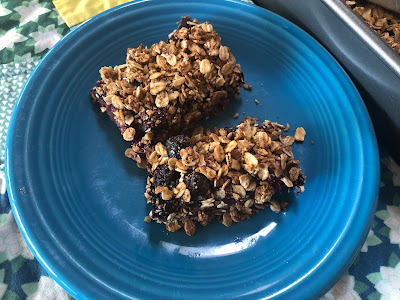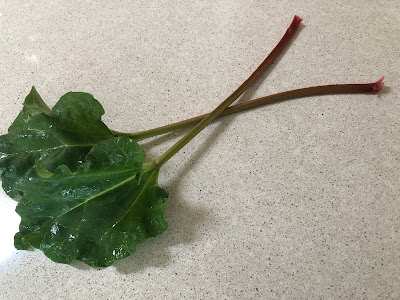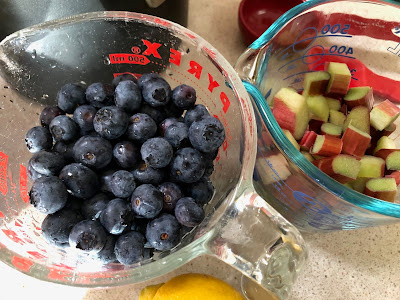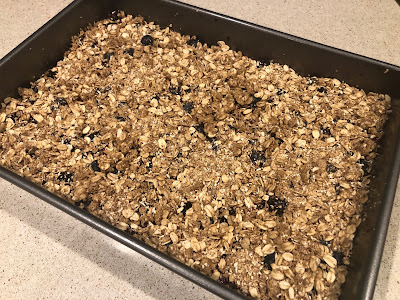
Recipe: Blueberry meets rhubarb at the breakfast table
 |
|
These "bluebarb" bars are just lightly sweet. (Photos:
Kathy Morrison)
|
My little rhubarb plant finally had stalks to harvest. They were skinny, but long enough -- a plant grown from a tiny seedling purchased a few years ago at an American River College plant sale.
Rhubarb is not the easiest crop to grow in our climate, but this potted rhubarb has hung in there, protected by the shade of my little peach tree.
And I thought "now or never" for harvesting this year, with the real summer weather approaching. The plant will soon follow its perennial schedule, dying back in heat and re-emerging next winter.
But two stalks weren't going to do much in any baked good, so I augmented them with one large purchased rhubarb stalk. Then I found a recipe that combines rhubarb with blueberries (which are just coming into season locally) in a no-dairy, no-egg oat bar. Just a little sweet, with a whole-grain base -- perfect for breakfast.
Note: The amount of fruit is variable. I started with about 3 1/2 cups total, then added another 1/2 cup of blueberries when I realized the fruit was going to be spread a little thin. The recipe as baked could have taken another 1/2 cup of either fruit easily, so the amounts listed below reflect that.
 |
|
They're thin but they're homegrown: My rhubarb stalks.
Note: Never eat the rhubarb leaves, or let pets eat them --
they're poisonous. Compost or discard them.
|
'Bluebarb' breakfast bars
Makes 24 bars
Ingredients:
1 teaspoon coconut oil (for pan)
Filling:
2-1/2 to 3 cups blueberries
1 to 1-1/2 cups chopped rhubarb
1/3 cup honey or maple syrup
Zest and juice of 1 large lemon (about 4 tablespoons juice)
1/8 cup water plus 1 tablespoon, divided
1/2 tablespoon vanilla extract
1 tablespoon cornstarch or arrowroot powder
Oat crust and top:
4 cups old-fashioned rolled oats
1 teaspoon nutmeg
2-1/2 teaspoons cinnamon
2 teaspoons baking powder
 |
|
The fruit as prepared: The rhubarb was chopped into chunks about
the same size as the blueberries, which were large.
|
1/2 teaspoon fine salt
2/3 cup unsweetened applesauce
2 tablespoons coconut oil (in liquid form); up to 1/2 tablespoon more if needed
1 tablespoon vanilla extract
Instructions:
Preheat oven to 375 degrees. Grease a 9-by-12-inch baking pan with the 1 teaspoon of coconut oil.
Combine the fruit, honey (or syrup), lemon zest, lemon juice, 1/8 cup water and vanilla in a medium saucepan. In a small bowl or measuring cup, combine the cornstarch and the 1 tablespoon of water into a slurry. Heat the fruit mixture over medium-high heat until it has a strong bubble going. Remove from heat and stir in the cornstarch/water slurry until well combined. Set aside to cool.
Put 2 cups of the rolled oats in a food processor or blender and blend until the oats are finely ground. Pour them into a large bowl along with the remaining oats, the nutmeg, cinnamon, baking powder and salt. Stir together, then add the applesauce, 2 tablespoons coconut oil and the vanilla. Mix together to get everything consistently blended. (Clean hands work best for mixing here.) Add a little more coconut oil if the mixture seems too dry. It shouldn't be wet when you're done, but you should be able to create small clumps.
 |
| The bars are layered and ready to go in the oven. |
Press half the oat mixture firmly and evenly into the greased pan. Spread the fruit mixture evenly over the crust, then crumble the remaining oat mixture over the fruit.
Bake 30 to 35 minutes. Allow pan to cool completely before cutting into bars.
Leftovers should be wrapped and refrigerated. (Wrap them individually for a quick snack.)
Variation: Substitute up to 3/4 cup of chopped nuts for an equal part of the whole rolled oats.
Comments
0 comments have been posted.Sacramento Digs Gardening to your inbox.
Sites We Like
Garden Checklist for week of April 14
It's still not warm enough to transplant tomatoes directly in the ground, but we’re getting there.
* April is the last chance to plant citrus trees such as dwarf orange, lemon and kumquat. These trees also look good in landscaping and provide fresh fruit in winter.
* Smell orange blossoms? Feed citrus trees with a low dose of balanced fertilizer (such as 10-10-10) during bloom to help set fruit. Keep an eye out for ants.
* Apply slow-release fertilizer to the lawn.
* Thoroughly clean debris from the bottom of outdoor ponds or fountains.
* Spring brings a flush of rapid growth, and that means your garden needs nutrients. Fertilize shrubs and trees with a slow-release fertilizer. Or mulch with a 1-inch layer of compost.
* Azaleas and camellias looking a little yellow? If leaves are turning yellow between the veins, give them a boost with chelated iron.
* Trim dead flowers but not leaves from spring-flowering bulbs such as daffodils and tulips. Those leaves gather energy to create next year's flowers. Also, give the bulbs a fertilizer boost after bloom.
* Pinch chrysanthemums back to 12 inches for fall flowers. Cut old stems to the ground.
* Mulch around plants to conserve moisture and control weeds.
* From seed, plant beans, beets, cantaloupes, carrots, corn, cucumbers, melons, radishes and squash.
* Plant onion sets.
* In the flower garden, plant seeds for asters, cosmos, celosia, marigolds, salvia, sunflowers and zinnias.
* Transplant petunias, zinnias, geraniums and other summer bloomers.
* Plant perennials and dahlia tubers for summer bloom.
* Mid to late April is about the last chance to plant summer bulbs, such as gladiolus and tuberous begonias.
* Transplant lettuce seedlings. Choose varieties that mature quickly such as loose leaf.